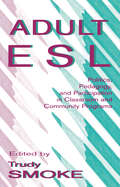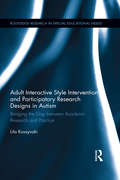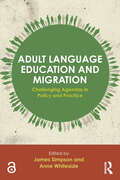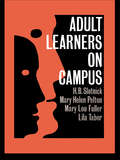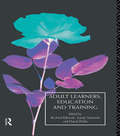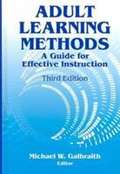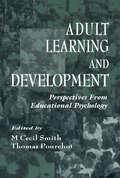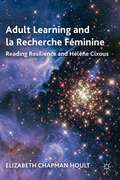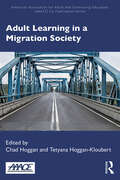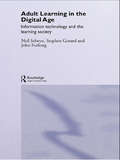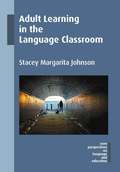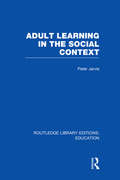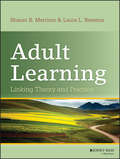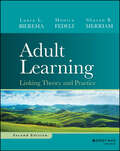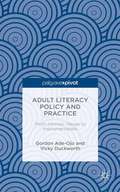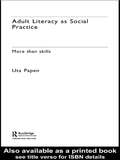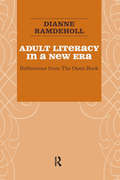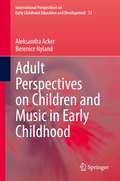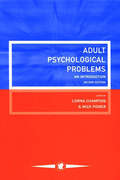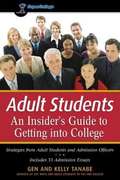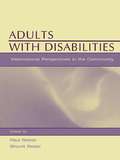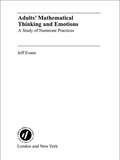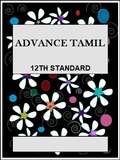- Table View
- List View
Adult Esl: Politics, Pedagogy, and Participation in Classroom and Community Programs
by Trudy SmokeThe essays in this book focus on political strategies, pedagogical models, and community programs that enable adult ESL learners to become vital members of North American society. This is particularly important in our present time of contraction and downsizing in the education of non-native speakers. The authors represent a broad range of programs and perspectives, but they all have in common the goal of enabling both faculty and students to become full participants in our society and thereby to gain control over their futures. Readers of this book will develop an understanding of the ways in which innovative educators are creating strategies for maintaining language programs and services.
Adult Interactive Style Intervention and Participatory Research Designs in Autism: Bridging the Gap between Academic Research and Practice (Routledge Research in Special Educational Needs)
by Lila KossyvakiRegardless of their cognitive and linguistic abilities, people with autism can often find it difficult to develop basic communicative skills that are necessary to gain full control over their environment and maintain their independence. Building on the author’s own cutting-edge research, Adult Interactive Style Intervention and Participatory Research Designs in Autism examines the impact that the interactive style of neurotypical individuals could have on the spontaneous communication of children with autism. This book provides clear and detailed guidance on how to conduct research into autism in real-world settings such as schools and homes. Kossyvaki critically evaluates a wealth of relevant case studies and focuses on a number of methodological issues that researchers are likely to face when carrying out research of this complex nature. The author walks the reader through present literature on the importance of spontaneous communication and the atypical way that this tends to develop in autism, before bringing the results of her own research to bear on the question of how the interactive styles of neurotypical individuals can impact on the spontaneous communication of people with autism. Adult Interactive Style Intervention and Participatory Research Designs in Autism is essential reading for academics, researchers, and postgraduate students in the fields of special educational needs, inclusion, autism, research methods, and educational and clinical psychology.
Adult Language Education and Migration: Challenging agendas in policy and practice
by James Simpson Anne WhitesideAdult Language Education and Migration: Challenging Agendas in Policy and Practice provides a lively and critical examination of policy and practice in language education for adult migrants around the world, showing how opportunities for learning the language of a new country both shape and are shaped by policy moves. Language policies for migrants are often controversial and hotly contested, but at the same time innovative teaching practices are emerging in response to the language learning needs of today’s mobile populations. This book: analyses and challenges language education policies relating to adult migrants in nine countries; provides a comparative study with separate chapters on policy and practice in each country; focuses on Australia, Canada, Spain (Catalonia), Finland, France, Ireland, the Netherlands, the UK and the US. Adult Language Education and Migration is essential reading for practitioners, students and researchers working in the area of language education in migration contexts.
Adult Learners On Campus
by Mary Lou Fuller H.B. Slotnick Mary Helen Pelton Lila TaborThe opportunity for a "second chance" is a growing phenomenon. Some members of the Adult Learners Consulting Group, a dozen or so faculty and graduate students at the University of Dakota, who have a general interest in the related processes of learning and teaching, investigated the specific concern about the ways older-than-average students learn and the instructional methods most appropriate for them. They recognized that for both the older student and the teacher of the older student there are problems and issues that are different from the average student or student/teacher relationship. In addition to presenting an integrated picture of adult learners on campus, this book also provides some teaching techniques that can be used in the classroom tomorrow.; It is aimed at teachers in further and adult education, trainers in all disciplines, researchers in adult and continuing education.
Adult Learners, Education and Training
by Richard Edwards Sandy Sieminski David ZeldinFirst Published in 1992. Routledge is an imprint of Taylor & Francis, an informa company.
Adult Learning Methods: A Guide for Effective Instruction (Third Edition)
by Michael W. GalbraithThe third edition of Adult Learning Methods, with revisions, updates, and six new chapters, provides the educator of adults with ways to understand and facilitate adult learning. It is a clearly written guide to understanding the complex aspects associated with techniques and methods of the teaching and learning encounter.
Adult Learning and Development: Perspectives From Educational Psychology (Educational Psychology Series)
by Thomas Pourchot M. Cecil SmithAdult education occurs whenever individuals engage in sustained, systematic learning in order to affect changes in their attitudes, knowledge, skills, or belief systems. Learning, instruction, and developmental processes are the primary foci of educational psychology research and theorizing, but educational psychologists' work in these domains has centered primarily on the childhood and adolescent school years. More recently, however, a number of educational psychologists have studied learning and development in adulthood. The results of these efforts have resulted in what is now called adult educational psychology. The purpose of this volume is to introduce this new subfield within educational psychology. Section 1 focuses on the interplay between learning and development in adulthood, how various forms of instruction lead to different learning outcomes for adults, description of the diverse social contexts in which adult learning takes place, and the development of metacognitive knowledge across the life span. Section 2 describes both research and theory pertaining to adult intellectual functioning, thinking, and problem-solving skills within various contexts. Section 3 describes research in a variety of adult learning domains; discusses the cognitive and behavioral dimensions of reading in adulthood and the applications of reading in real-life circumstances; examines an educational intervention developed to promote forgiveness; and relates the outcomes of an intervention designed to educate parents about their children's mathematics learning. Section 4 summarizes the themes and issues running throughout this, the first book that has sought to span the gulf between adult education, adult development, and educational psychology.
Adult Learning and la Recherche Féminine: Reading Resilience and Hélène Cixous
by Elizabeth Chapman HoultUsing Hélène Cixous' notion of 'l'écriture féminine' as an analogy for transformational learning and an investigative tool, Hoult explores why some adult learners are able to survive and thrive in the education system, despite facing significantly more challenges than the average student.
Adult Learning in a Migration Society (American Association for Adult and Continuing Education)
by Chad HogganMigration is an old, perhaps perpetual, phenomenon. Currently, it is an urgent challenge involving huge numbers of people who leave their home in search of a better life. Differences in language, customs, and norms are often joined by specific manifestations of xenophobia born of particular differences between host countries and their current influx of migrants. In a pronounced way, then, migration reveals important societal questions・of solidarity, of identity, of transition and transformation, of human rights and obligations. The explorations in this collection highlight individual stories of migrants, showcase innovative research methods, and explore concepts and theories that might be usefully applied toward learning needs in a migration society. Including insights from scholars across 14 different countries, this book offers an international perspective on the role of adult education in addressing migration. Such international comparisons hold great potential for seeing new possibilities in any single country, whether in Europe, North America, or across the world.
Adult Learning in the Digital Age: Information Technology and the Learning Society
by John Furlong Stephen Gorard Neil SelwynThis engaging book sheds light on the ways in which adults in the twenty-first century interact with technology in different learning environments. Based on one of the first large-scale academic research projects in this area, the authors present their findings and offer practical recommendations for the use of new technology in a learning society. They invite debate on: why ICTs are believed to be capable of affecting positive change in adult learning the drawbacks and limits of ICT in adult education what makes a lifelong learner the wider social, economic, cultural and political realities of the information age and the learning society. Adult Learning addresses key questions and provides a sound empirical foundation to the existing debate, highlighting the complex realities of the learning society and e-learning rhetoric. It tells the story of those who are excluded from the learning society, and offers a set of strong recommendations for practitioners, policy-makers, and politicians, as well as researchers and students.
Adult Learning in the Language Classroom
by Stacey Margarita JohnsonThis book explores connections between the fields of foreign/second language teaching and adult learning. This interdisciplinary approach serves as a framework in order to: (a) understand the teaching methods that promote the deeper, more critical sort of language learning advocated by scholars and professional organizations, (b) understand how adult students learn and transform through language study, and (c) reinforce the immense value of beginning language courses. Johnson studies a classroom of adult language learners for one semester, exploring issues of motivation and perceived value for these short-term learners as well as touching on issues around intercultural communication teaching and learning. The book will be of interest to adult language teachers as well as researchers studying adult education and second language learning.
Adult Learning in the Social Context (Routledge Library Editions: Education)
by Peter JarvisThis book is a logical progression from The Sociology of Adult and Continuing Education. The author takes a completely new approach to the subject and puts forward a model of adult learning which is analysed in depth. This model arises from the results of a research project in which adults analysed their own learning experiences.
Adult Learning: Linking Theory and Practice
by Sharan B. Merriam Laura L. BieremaSolidly grounded in theory and research, but concise and practice-oriented, Adult Learning: Linking Theory and Practice is perfect for master's-level students and practitioners alike. Sharan Merriam and Laura Bierema have infused each chapter with practical applications for instruction which will help readers personally relate to the material. The contents covers:Adult Learning in Today's WorldTraditional Learning TheoriesAndragogySelf-Directed LearningTransformative LearningExperience and LearningBody and Spirit in LearningMotivation and LearningThe Brain and Cognitive FunctioningAdult Learning in the Digital AgeCritical Thinking and Critical PerspectivesCulture and ContextDiscussion questions and activities for reflection are included at the end of each chapter.
Adult Learning: Linking Theory and Practice
by Sharan B. Merriam Laura L. Bierema Monica FedeliA freshly updated and science-based guide for contemporary adult educators In the newly revised second edition of Adult Learning: Linking Theory and Practice, a team of veteran adult educators delivers an authoritative guide to adult education that is solidly grounded in theory and research while remaining concise and practice oriented. Each chapter is infused with practical applications for instruction you can implement immediately to improve concrete learning outcomes. The authors cover a variety of topics, including adult learning in the contemporary world, traditional learning theories, andragogy, motivation and learning, and more. Readers will also find: Explorations of the brain and cognitive functioning as it applies to adult learners How to adapt and improve the adult learning experience in the digital age Learning and reflection activities integrated throughout each chapter Perfect for master's-level students and practitioners alike, Adult Learning: Linking Theory and Practice is the up-to-date and practical adult education resource that you've been waiting for.
Adult Literacy Policy and Practice: From Intrinsic Values To Instrumentalism
by Vicky Duckworth Gordon Ade-OjoThis book explores the gradual evolution of Adult literacy policy from the 1970s using philosophical, sociological and economic frames of reference from a range of perspectives to highlight how priorities have changed. It also offers an alternative curriculum; a transformative model that presents a more socially just different value position.
Adult Literacy as Social Practice: More Than Skills (New Approaches to Adult Language, Literacy and Numeracy)
by Uta PapenWith a radically new perspective on reading, writing and mathematics for adults, this refreshing and challenging book shows how teachers and curriculum developers have much to gain from understanding the role of literacy in learners' lives, bringing in their families, social networks and jobs. Looking at the practicalities of how teachers and students can work with social practice in mind, Adult Literacy as Social Practice is particularly focused on: * how a social theory of literacy and numeracy compares with other theoretical perspectives* how to analyze reading and writing in everyday life using the concepts of social literacy as analytical tools, and what this tells us about learners' teaching needs* what is actually happening in adult basic education and how literacy is really being taught* professional development. With major policy initiatives coming into force, this is the essential guide for teachers and curriculum developers through this area, offering one-stop coverage of the key concepts without the need for finding materials from far-scattered sources.
Adult Literacy in a New Era: Reflections from the Open Book (Series In Critical Narrative Ser.)
by Dianne RamdehollAdult Literacy in a New Era chronicles the history and development of The Open Book, an adult literacy organisation inspired by the legendary educationalist Paulo Freire, and other political educators. Using participants' own words and experiences, Ramdeholl analyses and investigates adult literacy policy and aspects of the program's history from its beginning in 1984 to its end in 2001. Offering new insights into methodologies of reading, writing, and learning, this book will inspire not only adult literacy students and teachers, but anyone concerned with changing public policy from the bottom up.
Adult Perspectives on Children and Music in Early Childhood (International Perspectives on Early Childhood Education and Development #33)
by Berenice Nyland Aleksandra AckerThis book focuses on the importance and role of adults in promoting music in the early years. Designed to promote the idea of the value of music in the early childhood years, the research discussed in this book explores the experiences of a number of adults working with children from birth to age 8. The initiatives discussed in this work all focus on adults who have encouraged the development of musical identities ranging from music in the home, to musical play in the preschool years, preparing a performance with children, and programs for disadvantaged groups that use music as a communicative tool. Each chapter will start with a description of the particular setting and the protagonists’ specific skills and interests and how they came to be working with young children. Themes for the chapters have emerged from the videos and interviews conducted and consist of both reflective and affective experience. The themes include musical background, the adults' own stories, theories of childhood, and pedagogy and philosophy.
Adult Psychological Problems: An Introduction (Contemporary Psychology Ser. #Vol. 5)
by Michael Power Lorna ChampionFirst published in 2000. Routledge is an imprint of Taylor & Francis, an informa company.
Adult Students: An Insider's Guide to Getting into College
by Gen Tanabe Kelly TanabeWhether you are going back to school for the first time, returning after an absence or advancing or changing your career, this book will help. Adult Students guides you step-by-step through the entire admission process from making the decision to return to college to gaining admission to figuring out how to pay the tuition bills.
Adults With Disabilities: international Perspectives in the Community
by Paul Retish Shunit ReiterThis book concerns the process of transition that we all make throughout our lifetime, and the necessary skills individuals with disabilities need to function outside of school. The book illustrates that the problems of transition are not just for persons with disabilities, but for everyone. Acceptance of differences, understanding that our perceptions may not be accurate, and the ability to be honest with one another are shown to be key elements in assisting transition.
Adults' Mathematical Thinking and Emotions: A Study of Numerate Practice (Studies In Mathematics Education Ser.)
by Jeff EvansThe crisis around teaching and learning of mathematics and its use in everyday life and work relate to a number of issues. These include: The doubtful transferability of school maths to real life contexts, the declining participation in A level and higher education maths courses, the apparent exclusion of some groups, such as women and the aversion of many people to maths. This book addresses these issues by considering a number of key problems in maths education and numeracy:*differences among social groups, especially those related to gender and social class*the inseparability of cognition and emotion in mathematical activity*the understanding of maths anxiety in traditional psychological, psychoanalytical and feminist theories*how adults' numerate thinking and performance must be understood in context.The author's findings have practical applications in education and training, such as clarifying problems of the transfer of learning, and of countering maths anxiety.
Advance Tamil class 11 - Tamil Nadu Board - SCERT: சிறப்புத் தமிழ் தமிழ்நாடு அரசு மேல்நிலை முதலாம் ஆண்டு
by Government TamilnaduEducation is not only the way to become wise but it is the foundation of life forever. We have understood that the textbooks in students hands create a way to succeed as well as lead others to follow up with new inventions. The methods and technics used in this book will definitely make the students to feel free and comfortable even while learning tough concepts.
Advance Tamil class 12 - Tamil Nadu Board - SCERT: தமிழ்நாடு அரசு மேல்நிலை இரண்டாம் ஆண்டு சிறப்புத் தமிழ்
by Scertஇந்த சிறப்புத் தமிழ் புத்தகத்தில் பாடங்கள் நாம் தமிழ் பற்றி கூடுதலாக தெரிந்து கொள்வதற்கு மிகவும் உதவியாக உள்ளது.
Advanced Adobe Photoshop CS5 Revealed
by Chris BotelloDiscover all that Photoshop CS5 has to offer with ADVANCED ADOBE PHOTOSHOP CS5 REVEALED. This book teaches advanced design techniques using one of the most popular photo-editing programs on the market. Using step-by-step tutorials, readers work with curves, levels, blending modes, painting and drawing tools, and the latest Photoshop special effects to create professional-quality designs and images. They are challenged not only as Photoshop users but as designers, following the steps a designer would take to complete real-world projects. They also see what works in a design and what doesn't. Readers then take their craft to the next level by using the advanced end-of-chapter learning projects. The book's full-color interior and highly visual design make this the ideal book for learning advanced design techniques using the latest version of Adobe Photoshop.
